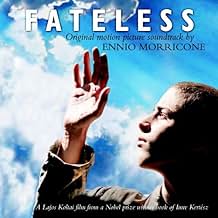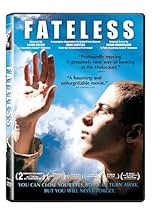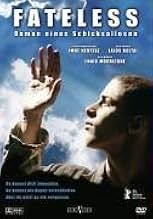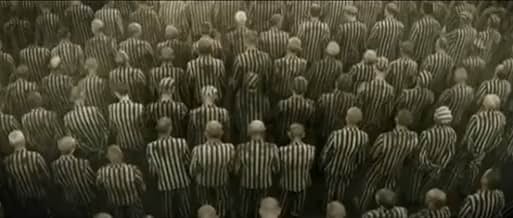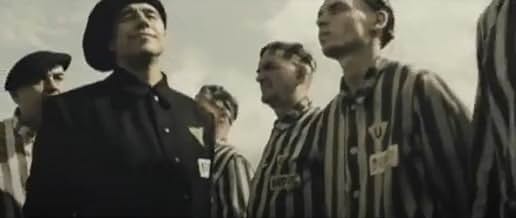14-year-old György's life is torn apart in WWII Hungary, as he is deported first to Auschwitz and then to Buchenwald, where he is forced to become a man in the midst of hatred, and what it r... Read all14-year-old György's life is torn apart in WWII Hungary, as he is deported first to Auschwitz and then to Buchenwald, where he is forced to become a man in the midst of hatred, and what it really means to be Jewish.14-year-old György's life is torn apart in WWII Hungary, as he is deported first to Auschwitz and then to Buchenwald, where he is forced to become a man in the midst of hatred, and what it really means to be Jewish.
- Awards
- 6 wins & 7 nominations total
- Moskovics
- (as Dani Szabó)
Featured reviews
If one has read Levi's Survival at Auschwitz, or Elie Wiesel's Night, many of the details of the story are familiar. But the craft is in the telling, and the director has done an excellent job of bringing a memoir of brutality and survival to life.
A brief synopsis, without spoilers, is that this is the story of a teenaged boy in Budapest in 1944 who is swept up in the Nazi roundup of Hungarian Jewry, and his experience in the concentration camps. (Elie Wiesel was interred in the same roundup.) The story of how Eichmann tried to ransom Hungarian Jewry to the West is interesting background, for those who are intellectually curious. (The allies were afraid to provide materiel and resources to the Nazis, fearing prolongation of the war. A very sad tale).
Making a film of the Holocaust is always a challenge. A director must strive to make the scenes powerful, without being melodramatic. There is also the danger of making another movie over again (eg, Schindler's List; The Reawakening; Europa, Europa). The challenge is to remain faithful to truth, while bringing artistry to the telling of it.
One device which is used to great effect is the use of very brief scenes, perhaps less than one minute, which tell a brief vignette of the daily life in the camps. Some have very little dialog, and they seem random and unconnected, yet together they add to a deeply moving experience.
Many films of the Holocaust are shattering; a few are hopeful. This is neither, but it is a telling of the story that is watchable for most audiences, yet retains the power to affect a viewer. 8 out of 10.
It takes quite a while for the viewer to understand that the point of Nobel-prize winning Imre Kertész's adaptation of his debut, semi-autobiographical novel is to tell the specific story of Hungarian Jews, as zero context is provided for the opening, anecdotal scenes, no dates, no background information on where in World War II we are starting from and not even how much time is passing in the first third of the film as the Nazis' net tightens on Budapest's Jews.
Perhaps director Lajos Koltai's goal in not providing the kind of context that was carefully established on films where he was the cinematographer, "Sunshine" and "Max," was to help us understand the bewilderment of the diverse Jewish community-- observant and secular, capitalists and workers, young and old, and the randomness of what happened to them. Families coalesce in confusion as they are buffeted by scraps of information, changing government directives, amidst anti-Semitism and collaboration by their fellow Hungarians. We're also supposed to believe, however, that amidst these confusions the young teen protagonist (the very expressive Marcell Nagy) has extensive philosophical discussions with his play mates, and the girl next door who he of course has a crush on, about Jewish identity. Otherwise, his WWII experiences look a lot like the boy's in Spielberg's "Empire of the Sun."
The next third of the film is gruesome experiences in concentration camps as we have seen before, even though these are extremely effectively re-enacted as the huge cast of actors and extras desiccate before our eyes. The production design in recreating the bare shelter and their work detail is the most realistic I've seen in a fiction film, as compared to documentaries and as described to me by a cousin who was the sole Holocaust survivor in our family (I'm named for her father who died in Auschwitz).
Halfway through these horrors, the theme of the film as to the uniqueness of the Hungarian experience starts to come through more than the usual Nazi sadism. Survival is linked to mutual dependence, camaraderie and bonding that comes from their national identification, even more than their shared religion (we see a few inmates nobly strive to maintain Jewish rituals). Individual personalities vividly come through and attitude and the help of one's fellow man turns out to be as important as food, as life is reduced to its most basic elements. The only other film I've seen that communicates this as emotionally was Peter Morley's documentary "Kitty: A Return to Auschwitz," about an essential mother/child bond.
Even during the camp experience, though, some subtleties are lost by lack of context for an English-speaking audience, as a few scenes were confusing to me as there was evidently significances if a character was speaking German or Hungarian, and that difference went by me. The German signage was not translated, so the last part of the boy's Buchenwald experiences was also confusing, unless the point was that he was mystified as well. The voice over narration throughout is, unnecessarily, for philosophical ruminations and does not communicate any additional information than the stark visuals and conversations.
With liberation indirectly providing the first date reference in the film as we presume it is 1945, Daniel Craig has a cameo as an American soldier, in his second appearance in a film in the past year as a Jew, after "Munich." His role recalls Montgomery Clift in Fred Zinnemann's 1948 "The Search," as one of the few films to also portray the wandering Jews as Displaced Persons amidst the rubble of Europe and their destroyed lives and communities.
The last section is movingly unique and vital viewing as we see Europeans, who we know from France to Russia but here particularly Hungarians, will settle into their amnesia and denial of responsibility, what a survivor in a documentary called "the 81st blow" that is the worst of all. While issues of vengeance are included in passing, the survivors seem like ghosts in their tattered prison garb as haunting images that affront and challenge returning normality like echoes of a nightmare that should go away in the light of day. The survivors are suffering from post-traumatic stress and cannot communicate what happened to them in language that the curious, whether family, friends or strangers, can understand-- or want to understand. The visceral impact is again marred by duplicative philosophizing.
Ennio Morricone's score emphasizes the potential for humanity, with beautiful vocalizations by Lisa Gerrard.
As to the cinematography, indiewire reports that the film used bleached-bypass color prints, with laser-applied subtitles: "In the concentration camps, it becomes more monochromatic. And after the liberation, the color comes back in." I saw it still in first run at NYC's Film Forum and the print was already scratched quite a bit, and there were frequent white on white subtitles.
A neighbor whose family had experiences as in the film provided background: "The Germans entered Hungary on March 19, 1944. They had exactly one year to do there what they did in Poland, Czechoslovakia, etc. in 6 years. The deportations started around April-May of 1944 from the outskirts of the country, leaving Budapest to the end and since the war was over the following May, there was no time to deport them as well. Jews from Budapest had to be terribly unlucky to be sent to the chambers. That's why my parents, who survived, and grandparents, who did not, were sent to the camps because they did not live in the capital. It was very haphazardly done from the capital. There were several groups of Jews who were taken from labor camps to the front in the Ukraine."
An easy criticism of Fateless is that conditions of the camp are shown as persistently harrowing, but rarely explicitly violent. The hero Köves is starved, slapped and humiliated, but rarely does the viewer see an on-screen killing, even if the stench of the crematoria is omnipresent. So much is real horror left unseen in fact that at the close of the film, upon his return, there's a scene where Köves is quizzed about the existence of gas chambers by a doubtful citizen at his home station. As a confirmation it is surely unnecessary for the audience, as we've seen them earlier. One suspects that the importance of this brief exchange is instead to assert, once and for all, that Köves acknowledges the reality of the horror he's seen. Whether or not such epic tragedy, and his involvement in it, has enriched his humanity, a la Spielberg, is another matter entirely. By the end, Köves thinks back to his experience almost nostalgically, to the camps where "life was cleaner and simpler" and "where there's nothing too unimaginable to endure." As one might expect from an acclaimed cinematographer, much of Fateless looks superb. Whether its the snowflakes, like the millions of spirits already departed, floating inside the cattle trucks that speed the Hungarian Jews to their fate, or the field of camp mates, paraded mercilessly in the heat, and wavering in their distinctive striped uniforms, Koltai's eye creates haunting moments which remain with the viewer long after the closing credits. Arguably such poetry detracts from the grim reality of the camps in which a good deal of the film is set; but a good deal of the film is shot in muted colours, a blanched scheme, as if the warmth of life has bled out into genocide.
Performances are generally excellent, notably that of Nagy. Interviews on the disc show the young actor's nervousness at some of the more demanding scenes (and the increasing time required spent in make up as his on screen physical deterioration continues) but he plays a role which takes him from the dining room of the family home of Budapest to the death carts of Zief, without faltering. Fateless is an international co-production between Hungary, German and England. All three languages make their appearance, and so - incidentally - does the new James Bond, Daniel Craig, as Köves' liberation approaches. Here playing a concerned GI, who strongly suggests the boy seeks out a new life and a university place in the west, Craig makes a brief, if effective impression. As it turns out Köves' ultimate decision is characteristic of a film that favours reality over idealism.
But for those who seek the unrelenting grimness of camp life depicted as in, say, One Day In The Life of Ivan Denisovitch (1970), or the memorable depiction of the hardening of innocence into vengeful shock (Come And See), Fateless will doubtless prove a slight disappointment. Ennio Morricone's excellent score notwithstanding, which gives events here an occasionally pathetic sheen, this is a film which in many ways raises more issues and questions than it answers, and certainly offers no stereotypical picture of a ghastly time. Instead, by asking the audience to question preconceptions, it stakes claim to being one of the more important Holocaust dramas of our time.
There are weaknesses too, of course, some dialogues, mainly in the beginning of the film are not natural (maybe it comes from Kertész's newness in film-writing), it' very disturbing as some weak acting in a few episodes. Marcell Nagy is not a bad choice for the leading role, he has the look and the power in his eyes but in speech he's not convincing, it drops you out of the atmosphere sometimes but it won't bother the not-Hungarian audience.
'Fateless' is an impressive European masterpiece, Hungary should be proud of it.
Did you know
- TriviaThe production unexpectedly ran out of money halfway through and halted for several months in order to find new investors. This ended up working in its favor, since Marcell Nagy was going through puberty, and by the time they restarted, he looked physically more mature, taller, and his voice deeper. By the time his character enters and survives the death camp, he looks several years older than when the film began, adding an element of reality that otherwise would have been created with make-up.
- Quotes
[last lines]
György Köves: [narrating] People only ask about the horrors, whereas I should talk about the happiness of the camps next time, if they ask. If they ask at all. And if I don't forget myself.
- Crazy creditsFlash v. Schwabenland, Production Dog
- SoundtracksHoldvilágos éjszakán (On a Moonlit Night)
Music by Mihály Eisemann
Lyrics by István Zágon
Sung by the four boys when the group is in transit
- How long is Fateless?Powered by Alexa
Details
- Release date
- Countries of origin
- Official sites
- Languages
- Also known as
- Fateless
- Filming locations
- Production companies
- See more company credits at IMDbPro
Box office
- Budget
- HUF 2,500,000,000 (estimated)
- Gross US & Canada
- $196,857
- Opening weekend US & Canada
- $12,680
- Jan 8, 2006
- Gross worldwide
- $2,512,009
- Runtime2 hours 20 minutes
- Color
- Sound mix
- Aspect ratio
- 2.35 : 1
Contribute to this page






